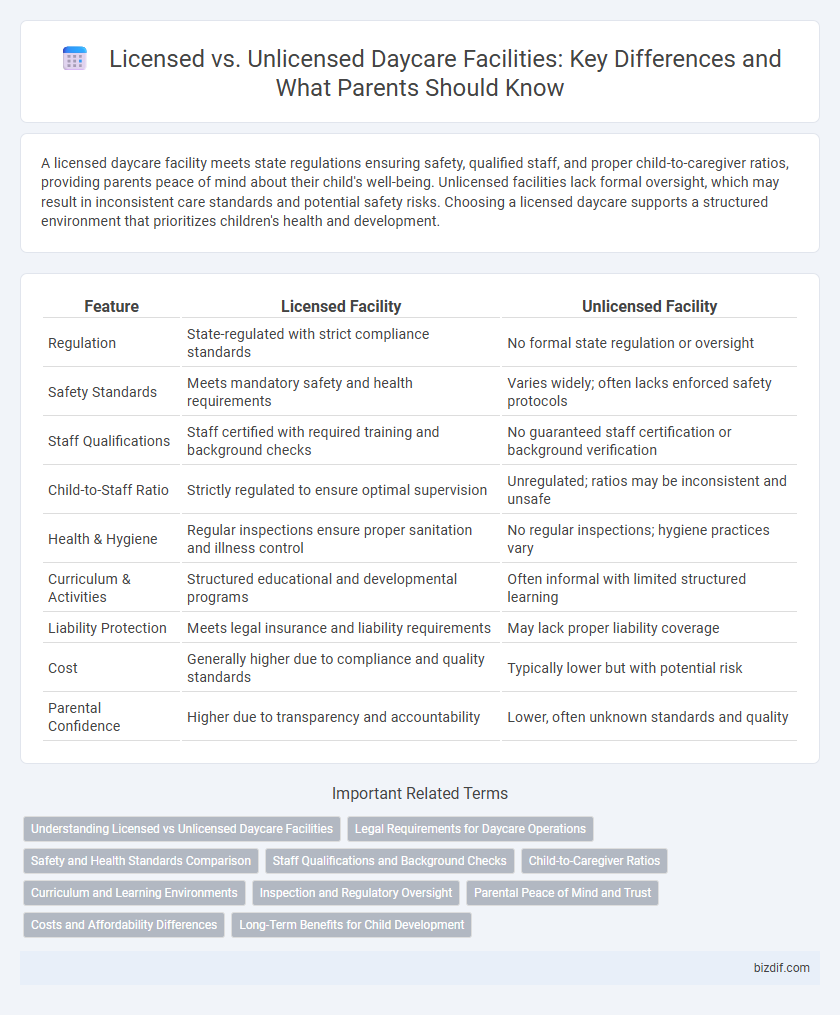A licensed daycare facility meets state regulations ensuring safety, qualified staff, and proper child-to-caregiver ratios, providing parents peace of mind about their child's well-being. Unlicensed facilities lack formal oversight, which may result in inconsistent care standards and potential safety risks. Choosing a licensed daycare supports a structured environment that prioritizes children's health and development.
Table of Comparison
| Feature | Licensed Facility | Unlicensed Facility |
|---|---|---|
| Regulation | State-regulated with strict compliance standards | No formal state regulation or oversight |
| Safety Standards | Meets mandatory safety and health requirements | Varies widely; often lacks enforced safety protocols |
| Staff Qualifications | Staff certified with required training and background checks | No guaranteed staff certification or background verification |
| Child-to-Staff Ratio | Strictly regulated to ensure optimal supervision | Unregulated; ratios may be inconsistent and unsafe |
| Health & Hygiene | Regular inspections ensure proper sanitation and illness control | No regular inspections; hygiene practices vary |
| Curriculum & Activities | Structured educational and developmental programs | Often informal with limited structured learning |
| Liability Protection | Meets legal insurance and liability requirements | May lack proper liability coverage |
| Cost | Generally higher due to compliance and quality standards | Typically lower but with potential risk |
| Parental Confidence | Higher due to transparency and accountability | Lower, often unknown standards and quality |
Understanding Licensed vs Unlicensed Daycare Facilities
Licensed daycare facilities adhere to strict state regulations, ensuring safety, staff qualifications, and educational standards, which promotes a secure environment for children's development. Unlicensed facilities often operate with fewer oversight requirements, potentially lacking standardized safety measures and trained caregivers. Choosing a licensed daycare provides families with greater assurance of quality care and regulatory compliance.
Legal Requirements for Daycare Operations
Licensed daycare facilities must comply with strict legal requirements, including safety standards, staff qualifications, and regular inspections to ensure child welfare. Unlicensed daycare facilities operate without government approval, often lacking mandated safety protocols and oversight, which can pose risks to children. Understanding these legal distinctions is crucial for parents seeking secure and compliant childcare options.
Safety and Health Standards Comparison
Licensed daycare facilities adhere to strict safety and health standards regulated by local and state authorities, including child-to-staff ratios, sanitation protocols, and emergency preparedness. Unlicensed daycare centers often lack formal oversight, resulting in inconsistent adherence to hygiene practices and safety measures that may jeopardize children's well-being. Choosing a licensed facility ensures compliance with verified background checks, routine inspections, and standardized health requirements critical for child safety.
Staff Qualifications and Background Checks
Licensed daycare facilities require staff to meet specific qualifications, including formal education and ongoing training in early childhood development, ensuring a higher standard of care. Rigorous background checks, including criminal records and child abuse clearances, are mandatory for all employees in licensed centers to guarantee child safety. Unlicensed facilities often lack these stringent requirements, increasing potential risks related to staff competency and child protection.
Child-to-Caregiver Ratios
Licensed daycare facilities enforce strict child-to-caregiver ratios to ensure safety and personalized attention, typically maintaining one caregiver per 4 to 8 children depending on age groups. Unlicensed facilities often lack regulated staffing standards, which can lead to higher ratios and potentially compromised supervision and care quality. Maintaining optimal child-to-caregiver ratios is crucial for developmental support and child safety compliance in licensed environments.
Curriculum and Learning Environments
Licensed daycare facilities adhere to state regulations that mandate structured curricula promoting cognitive, social, and emotional development through age-appropriate activities and qualified educators. Unlicensed facilities often lack standardized learning frameworks, resulting in inconsistent educational quality and limited developmental support. The learning environment in licensed centers is designed to meet safety and developmental standards, fostering a nurturing space optimized for early childhood growth.
Inspection and Regulatory Oversight
Licensed daycare facilities undergo regular inspections by state or local regulatory agencies to ensure compliance with health, safety, and staffing standards. These oversight measures include fire safety checks, sanitation reviews, and staff background verifications, which help protect children's well-being. Unlicensed facilities lack formal inspection requirements, increasing the risk of unmonitored hazards and inconsistent care quality.
Parental Peace of Mind and Trust
Licensed daycare facilities adhere to state regulations and safety standards, providing parents with verified assurance of child well-being and professional care. Unlicensed centers often lack consistent oversight, potentially increasing risks and diminishing parental confidence in quality and security. Selecting a licensed daycare enhances trust and peace of mind by ensuring compliance with health, safety, and caregiver qualification requirements.
Costs and Affordability Differences
Licensed daycare facilities typically have higher operating costs due to stringent regulatory compliance, staff qualifications, and safety standards, which often results in higher tuition fees compared to unlicensed facilities. Unlicensed daycares may offer more affordable rates but can lack standardized oversight, potentially compromising quality and safety. Families must weigh the cost differences against the value of licensed care to ensure both affordability and child well-being.
Long-Term Benefits for Child Development
Licensed daycare facilities adhere to strict safety, health, and educational standards, ensuring a structured environment that supports cognitive, social, and emotional development in children. Research shows that children in licensed centers exhibit better language skills, improved social interactions, and readiness for school compared to those in unlicensed settings. Long-term benefits include higher academic achievement and enhanced behavioral outcomes due to qualified staff and regulated curricula found exclusively in licensed daycare programs.
Licensed facility vs Unlicensed facility Infographic

 bizdif.com
bizdif.com